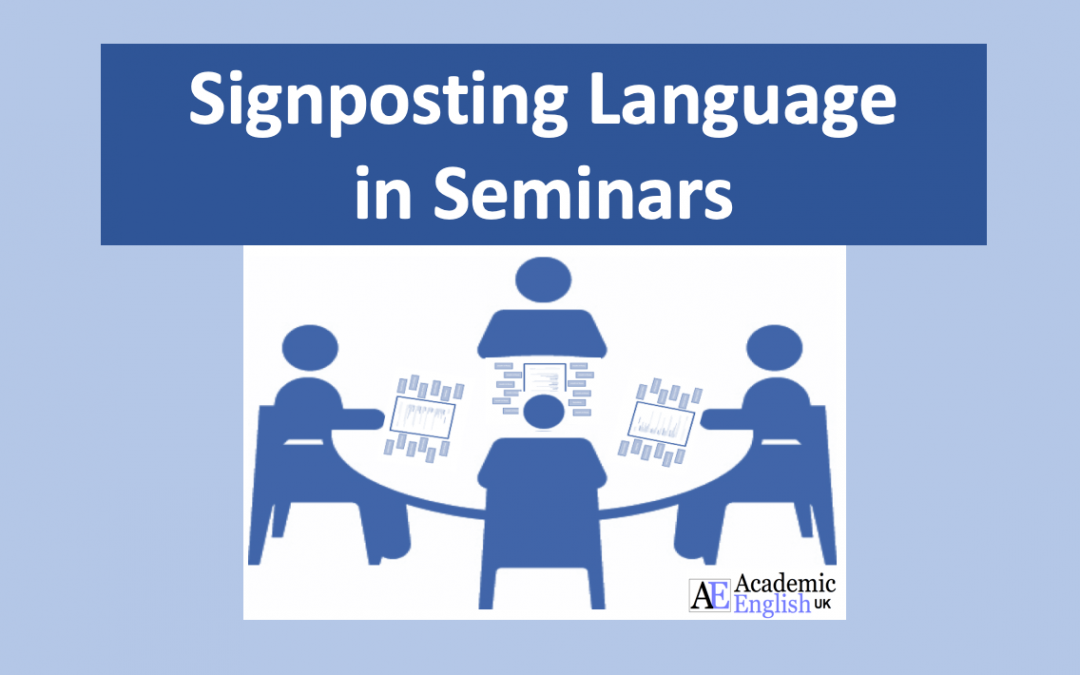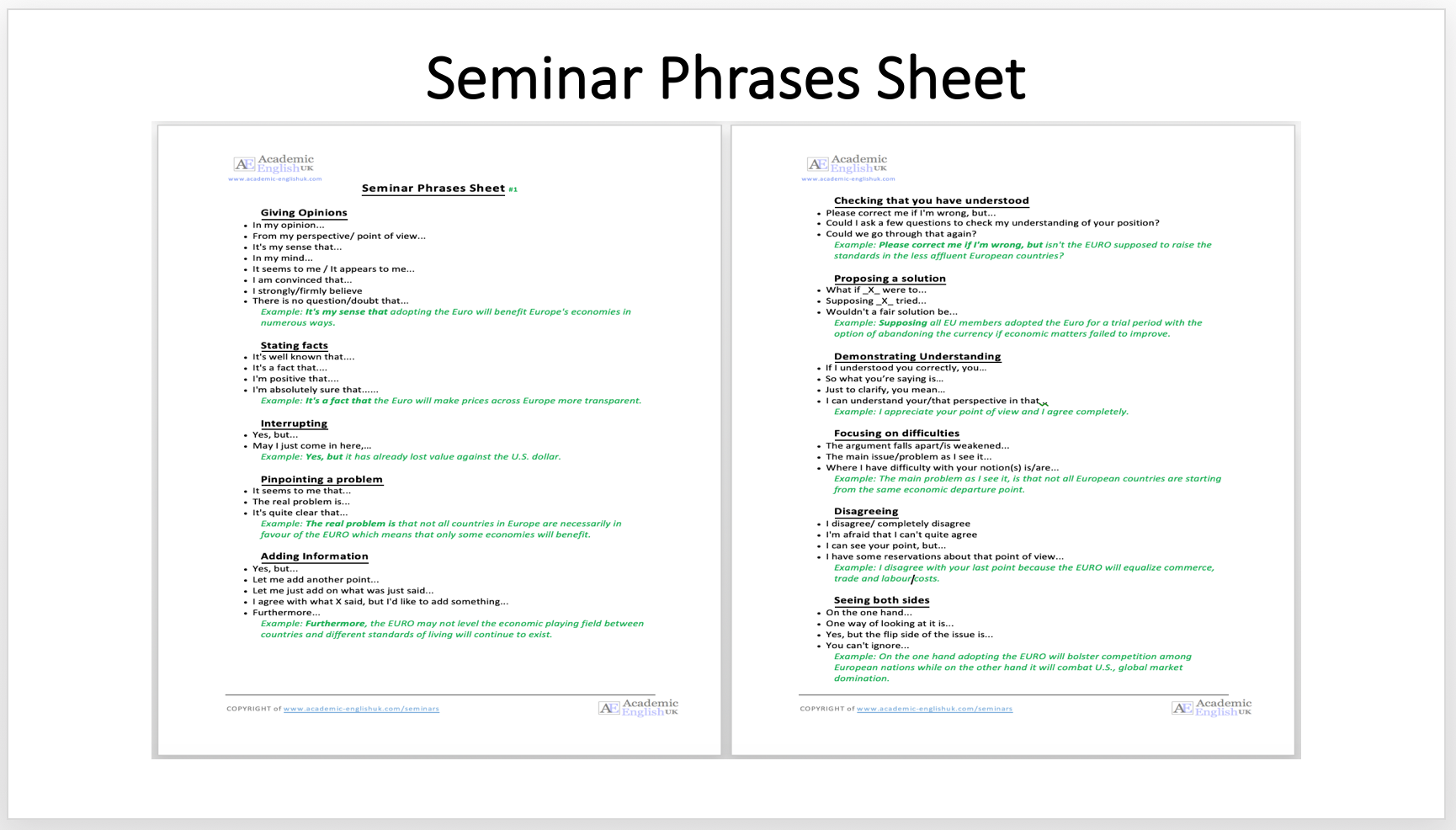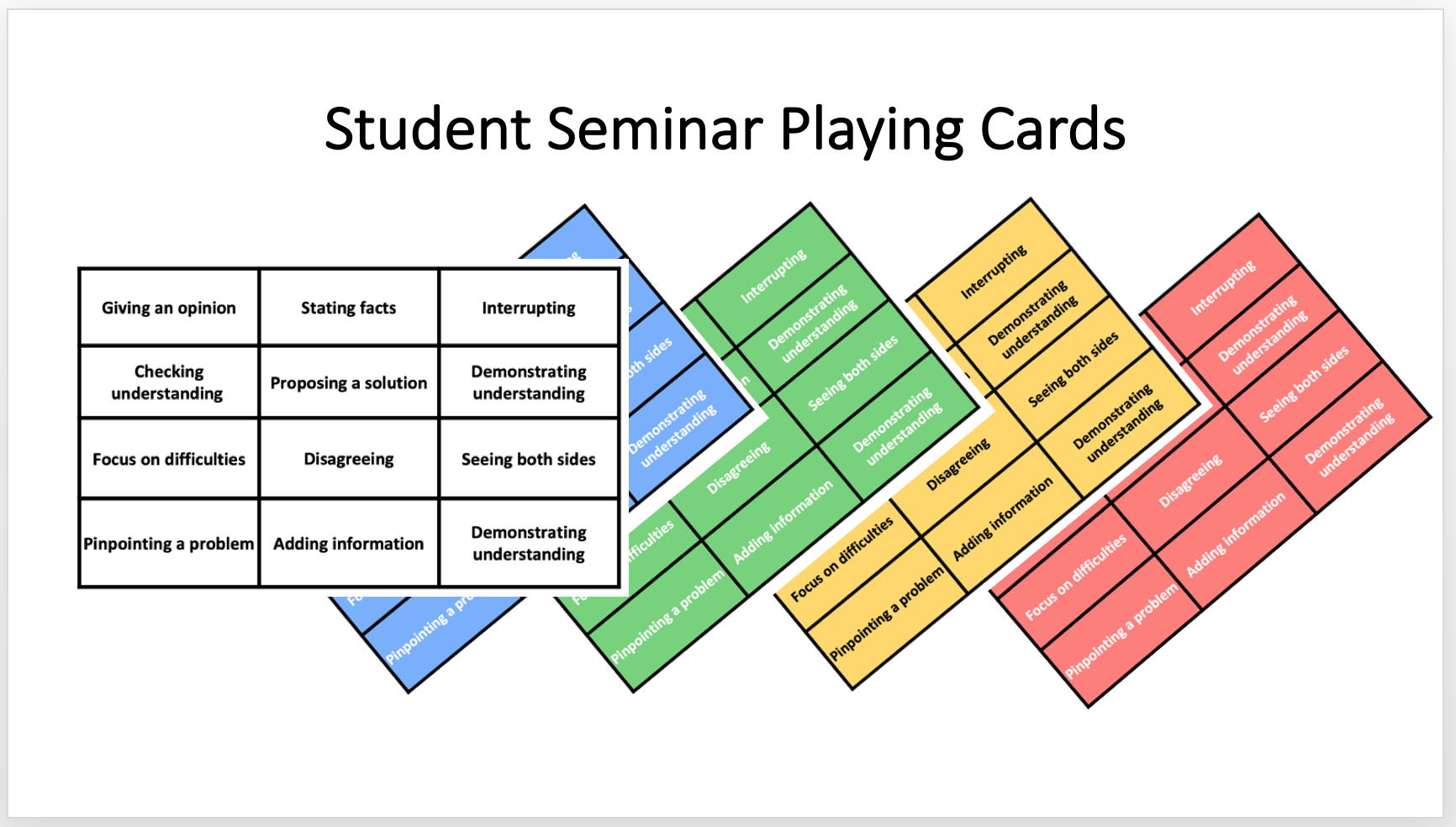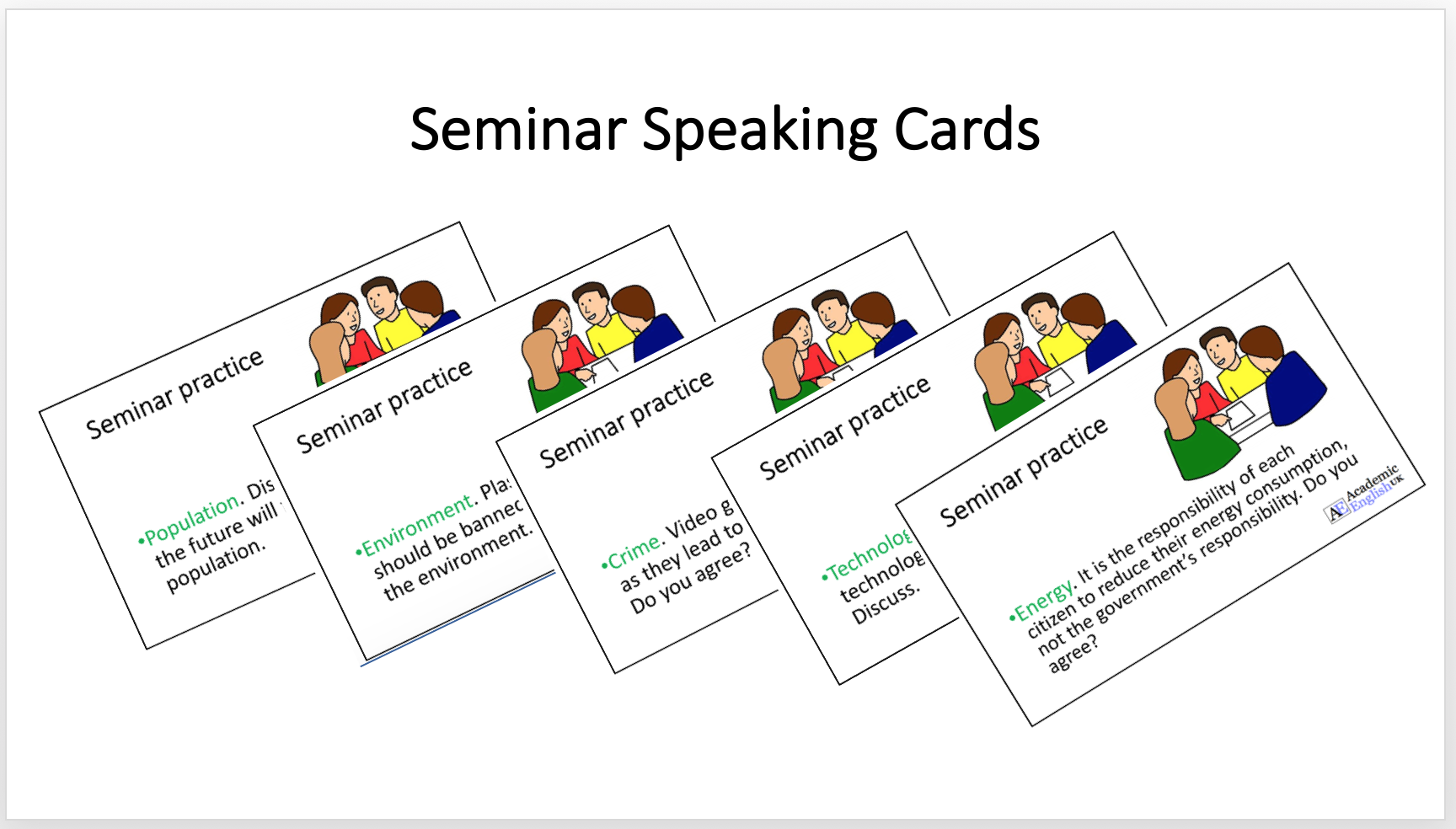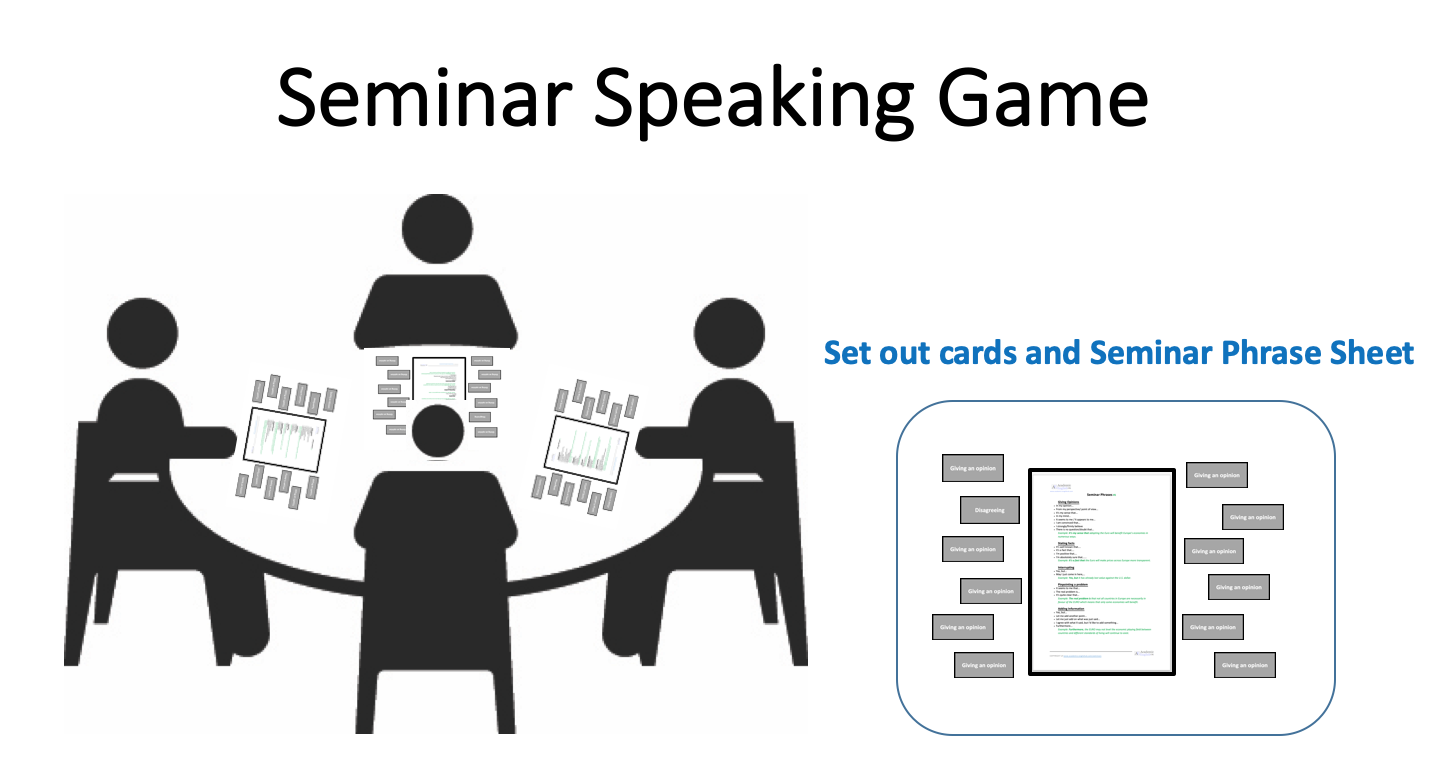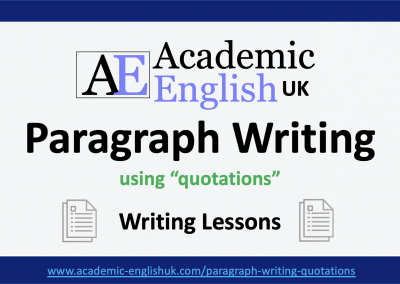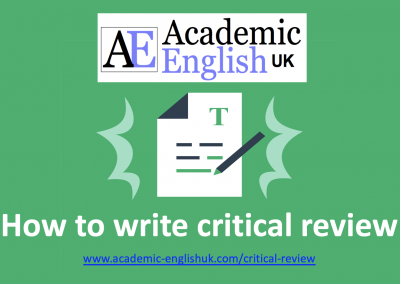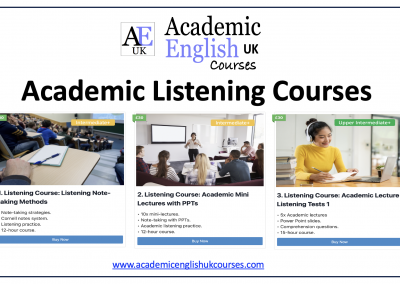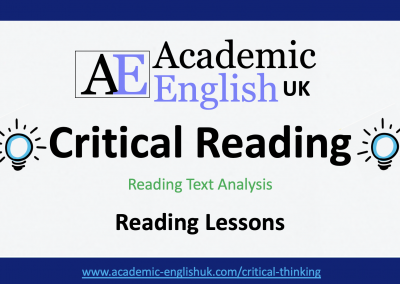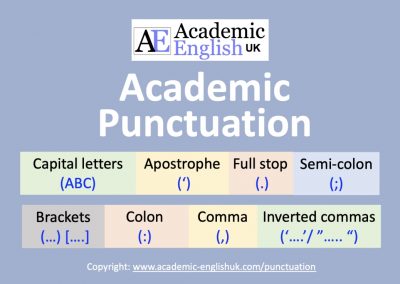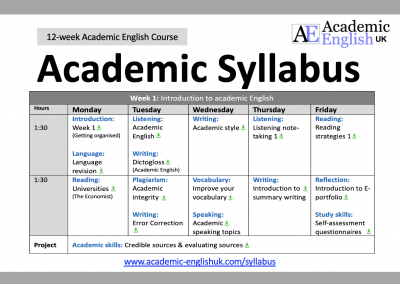Signposting Language in Academic Seminars
What is signposting in academic seminar speaking?
Signposting language is words and set phrases used in seminars to guide and the focus the discussion. Often in seminar assessments students are expected to use a range of signposting to show engagement and interactivity with fellow students. This lesson develops the students’ awareness and ability to use signposting phrases in seminars.
The Lesson
1. Seminar Phrase sheet
- Elicit ‘signposting’ in a seminar.Answer: Signpost Language is a range of fixed common phrases that are generally used in discussion to help orientate and focus the seminar.
- Give an example of phrase such as: Giving an opinion: ‘From my perspective…’
- Elicit some of the phrases from the Seminar Phrases #1 sheet.
- Give out the Seminar Phrases #1 sheet and ask students to read through and highlight any of the phrases that are new or they don’t usually use.
2. Back to the board / hot seat
- Put students into groups of 4/5. One student sits on a seat with their back to board. Teacher writes one of the phrases on the board. Students try to explain the phrase using synonyms / mime / examples. The first student who can recite the exact phrase wins. More Information: https://www.teachingenglish.org.uk/article/hot-seat-0
3. Seminar Speaking Game
- Hand out Student Seminar Playing Cards to each student in each group.
- Give out one Seminar Speaking Card to each group.
- Students sit around a table with their Seminar Phrases Sheet and the Student Seminar Playing Cards in front of them (see pic).
The Objective
- For students to speak about a given topic (Seminar Speaking Cards) using prompt cards (Student Seminar Playing Cards) to activate the language on the Seminar Phrases sheet.
- Students try to get rid of as many of their prompt cards (Student Seminar Playing Cards)as possible.
- Students discuss the topic for 5-10 minutes.
- IMPORTANT: most important part is the discussion of the topic – tell students not to just focus on getting rid of their cards.
- After 5- 10 minutes STOP the discussion. Students collect their cards and count how many cards they managed to get rid of.
- Then repeat the activity again but give out a different seminar speaking card.
 Signposting Language in Seminars: Free Download
Signposting Language in Seminars: Free Download
This lesson develops students’ awareness and ability to use signposting phrases in seminars. It begins by introducing a list of seminar phrases, practicing these phrases in groups and finishes with a kinaesthetic card game to activate the phrases learnt. Really fun lesson! Level: ***** [B1/B2/C1] TEACHER MEMBERSHIP / INSTITUTIONAL MEMBERSHIP
More Seminar information…
What is a seminar?
Generally, it is a small discussion on a specific topic among a group of students. At university it can be a central part of the learning process from lecturers creating seminars around pre-reading texts or post-lecture discussions. Commonly, at university English language centres seminars have become a feature of testing English speaking though fluency, conversational skills and ability to discuss complex subjects.
Why have seminars?
- explore topics in more depth
- share ideas in a way that will advance your thinking
- learn from other people’s experiences and background knowledge
- improve transferable skills for career development
Pre-seminar procedures
Students are often given pre-texts and pre-listenings before the seminar to prepare. Students are expected to read and listen to texts carefully by making detailed notes and come to the seminar fully prepared.
A Seminar Test – a seminar test usually…
- Consists of 6 people (one can be nominated the chair person)
- A set of questions
- Lasts for 25-30minutes
- The last 5 minutes summarise key points
- Students CAN use their texts and notes
The seminar process
- The group are called into a room and sit around a table.
- The questions are given out and students have 3 minutes to read and prepare
- The seminar begins with an opening statement – what you are here today to discuss?
- The students then begin to discuss the first question.
- Each student should make a contribution by referring to their notes / texts.
- The Seminar should flow with students adding to what was previously said.
- Once everyone agrees this question has been addressed in full, then they move onto the next question.
- Important: not all the questions have to be answered but they should be discussed in order
- Important: Sometimes choosing a chair person can create problems and it’s better if the students run it collectively.
- Once the students begin to approach 25 minutes they should bring it to an end by each one summarising a main point raised.
key points to a seminar
- It should be a flowing conversation with everyone involved and contributing.
- The teacher / tutor should not intervene if it goes quiet but let the students manage the discussion.
- Students have to show confidence and demonstrate thorough awareness of texts.
- Dominant students are penalised for not sharing and including others.
- Grouping is important (careful consideration is needed on putting students in groups)
- key debate phrases should be used to should conversation skills – agreeing, disagreeing, interrupting, etc…
 Seminar Speaking Criteria x2
Seminar Speaking Criteria x2
There is a basic seminar speaking criteria to assess seminar speaking skills which has four key criteria: Language accuracy, language range, pronunciation and communicative effectiveness. Also, another seminar criteria that includes ‘reference to materials’. Example / Level: ***** [B1/B2/C1] TEACHER MEMBERSHIP / INSTITUTIONAL MEMBERSHIP
Seminar Criteria
Use this basic criteria to grade you students seminar skills – paid version has two versions – see Example.
Seminar Speaking Criteria x2
There is a basic seminar speaking criteria to assess seminar speaking skills which has four key criteria: Language accuracy, language range, pronunciation and communicative effectiveness. Also, another seminar criteria that includes ‘reference to materials’ [webpage]. Example / Level: ***** [B1/B2/C1] TEACHER MEMBERSHIP / INSTITUTIONAL MEMBERSHIP
Seminar Lesson Download
Independent Learning seminar
This worksheet is based on four videos. Students listen and take notes on the videos and then summarise their ideas on the worksheet. Using their new knowledge they formulate an Independent Learning action plan. With all this information they have a 20-30 minute seminar using a set of questions. Videos Level: ***** [B1/B2/C1] TEACHER MEMBERSHIP / INSTITUTIONAL MEMBERSHIP
Independent Learning worksheet
This worksheet is based on four videos. Listen to the videos and take notes. Then use your notes to answer the questions and compare your answers to the key answers [webpage]. Example / Video Level: ***** [B1/B2/C1] TEACHER MEMBERSHIP / INSTITUTIONAL MEMBERSHIP
‘Designer Babies’ Seminar Discussion – 1x listening & 2x texts
This is an academic seminar discussion lesson. Students take notes on a short scientific lecture and two short texts. The students use these notes to take part in a 20 minute academic seminar. Example. Use Seminar Assessment Criteria here. Level: ***** [B2/C1/C2] / Video [05.05] / TEACHER MEMBERSHIP / INSTITUTIONAL MEMBERSHIP
 Teamwork Lesson – 1x reading, 1x activity & 1x listening.
Teamwork Lesson – 1x reading, 1x activity & 1x listening.
This lesson develops an understanding of teamwork. The lesson includes a discussion, a reading on creating a good team, a FUN ‘Marshmallow Challenge’ team-building activity and a short TED Talk lecture worksheet based on the findings of the activity. Example. Level: ***** [B2/C1/C2] / Video [06:44] / PPT / TEACHER MEMBERSHIP / INSTITUTIONAL MEMBERSHIP

